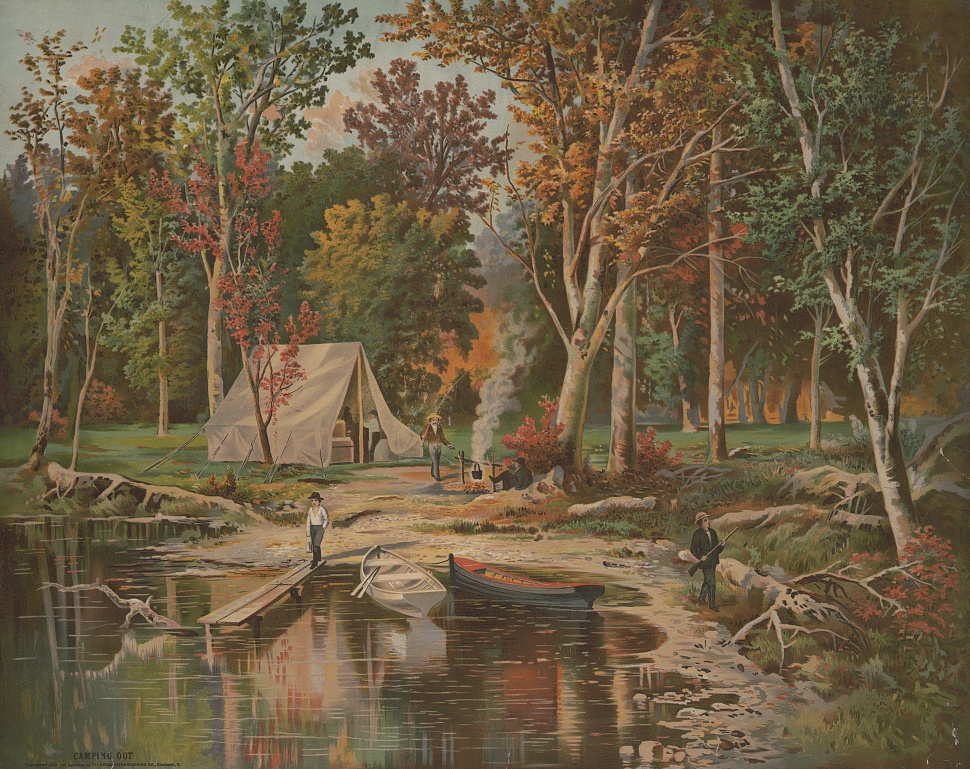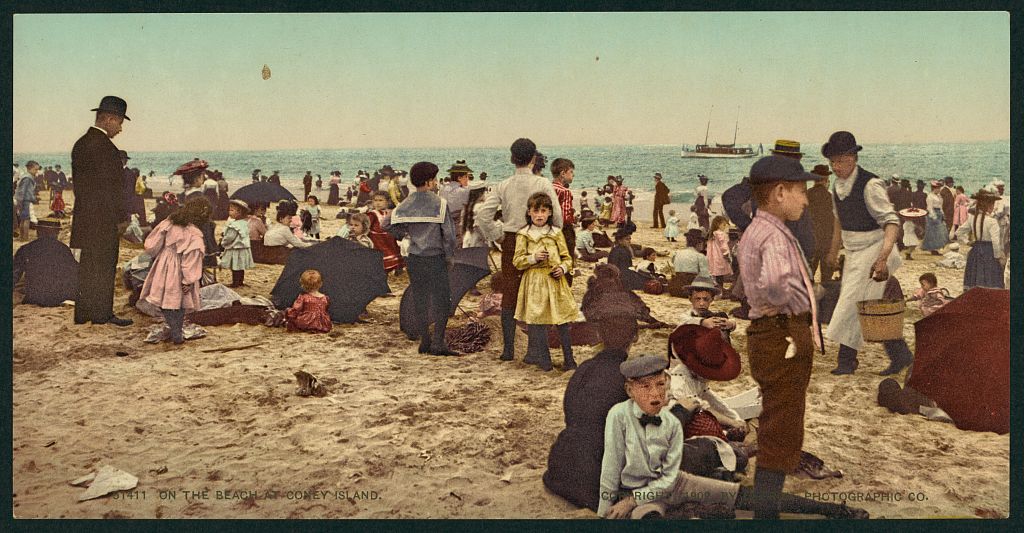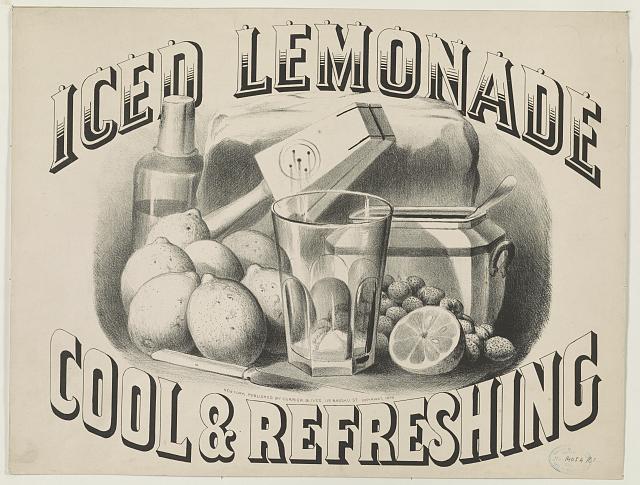The word “camping” often inspires nostalgic summer memories in the outdoors or dreams of future escapes to nature. However, camping as a fun and relaxing activity is a new concept in the long history of human experience. Camping isn’t always a vacation for everyone.
Originally, a camp was the place where military troops were located, either an entrenched and fortified permanent site or temporary location. Many of the earliest uses of “camp” in English from the 16th century are references to military sites. Over time, the act of camping became associated with sleeping outdoors. 1
Select the images for a larger view and more information.
Camping for fun in the 19th century

Camping, for fun and relaxation, became a popular and wholesome choice for late 19th-century middle-class vacationers. Popular with men looking for adventure far from their busy, urban lives or entire families seeking an alternative to expensive, watering-place resorts. Camping was believed to be good for the mind and body. Camping vacations offered the therapeutic and curative qualities of nature and fresh air and leisure activity requiring strenuous physical exercise.
Camps and camping was often associated with religious activities in the 19th century, making it a better moral choice than the dissolute activities, such as flirting, gambling, drinking, and dancing, provided at popular resorts. The tradition of Protestant camp meetings on the American frontier in the early 19th century was transformed into permanent vacation-destination “camps” such as the Methodist Church’s Ocean Grove on the New Jersey seashore.
Camping was also recommended by reformers as the ideal vacation for working-class families unable to afford any other type of summer get-away. However, those recommending camping to the poor often ignored the wider economic realities faced by people who couldn’t afford time away from their jobs or the transportation to a remote location, even if camping itself was cheap.2
Camping and automobiles

By the 1910s, campers could tour the countryside in their own automobiles, spending each night in a new location. Early auto-campers made camps along the roadside at will, often conflicting with private property owners. By the 1920s, established campsites began to open to serve the growing crowd of campers, charging fees to screen out “undesirable” itinerant migrant workers and poor campers. Enterprising business owners recognized the financial opportunity and sought to attract customers with modern conveniences – electric lights, hot showers, and even small cabins with kitchen facilities. Others started marketing special camping equipment to these back-to-nature vacationers.
By the late 1920s, the motel was born. Originating as upgraded camping cabins or cottage camps, the motor hotel offered the comforts along the highway as the old-style hotels located near train stations. By 1945, the “motor court” or motel industry was well-established enough to attract large-scale development across the nation.3
Camping in the 21st century

Today, one can choose from all sorts of overnight, outdoor experiences – from a cheap night sleeping on the ground at a local park to an exotic and expensive “glamping” vacation. According to a recent survey, about 60% of U.S. households had at least one camper in 2018. Tents ranked as the most common form of accommodation (61%) and about one-fourth of those surveyed reported using recreational vehicles or cabins.
Getting away from it all is still a major reason people choose camping. Campers in the past and now focus on relaxation, escape from daily life, affordability, and physical activity. However, campers report that phone service and WiFi are important and 97% take their mobile device, even though about half report that technology detracts from their overall enjoyment. Camping remains a primarily middle-class pursuit. And businesses still recognize the financial opportunity in promoting camping experiences and gear.
Camping isn’t always fun or a vacation
However, the word “camp” is often associated with experiences very remote from summer fun. Internment or concentration camps, locations where prisoners are detained because of political reasons, their nationality, or ethnicity, have existed in the past as well as in the 21st century. Refugee camps filled with people fleeing natural, economic, political or other human-made disasters dot the pages of history and the modern map.
This Depression-era song, “Keep Moving” recounts the hardship of the migration by refugees fleeing the Dust Bowl and seeking new opportunities.

How can you keep on moving unless you migrate too
They tell you to keep on moving but migrate, you must not do
The only reason for moving and the reason why I roam
Is to go to a new location and find myself a home
I can’t go back to the homestead, the shack no longer stands
They said I wasn’t needed, had no claim to the land
They said, “You better get moving, it’s the only thing for you”
But how can you keep moving unless you migrate too?
Now if you pitch your little tent along the broad highway
The Board of Sanitation says, “Sorry, you can’t stay”
Move on, move on, get moving it’s their everlasting cry
Can’t stay, can’t go back, can’t migrate, so where the heck am I?
I cannot stand the miseries that follow me as I roam
Unless I’m looking forward to a place I can call home
So I think I’ll round up all the folks and see what we can do
‘Cause how can you keep moving unless you migrate too?
To learn more . . .
For more about the history of daily life, historical primary sources, and instructional activities by this author:
- Exploring Vacation and Etiquette Themes in Social Studies
- Discovering Quacks, Utopias, and Cemeteries;
- Investigating Family, Food, and Housing Themes in Social Studies.

Author’s note: Camping was NOT a part of my childhood family vacation experience. My dad was a farmer; he spent every day outside. My mom worked full-time outside the home so her idea of a vacation did not involve cooking over a fire and “roughing it.” We lived in the country and I could see stars and hear bugs chirping every summer night through the windows of our un-airconditioned house. My only childhood camping experience involved kid’s summer camps, at which I usually developed severe homesickness.
Footnotes
- Oxford English Dictionary
- “Camping Out for the Poor” The Century Illustrated Monthly Magazine. v.44 (August 1892): 632-34.
- Warren James Belasco, Americans on the Road, From Autocamp to Motel, 1910-1945 (Baltimore: The Johns Hopkins University Press, 1979).e



One thought on “Camping: A Night Under the Stars is Not Always a Vacation”